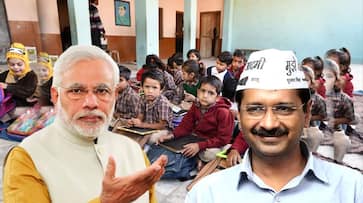While Delhi chief minister Arvind Kejriwal and his deputy Manish Sisodia stunned society on Monday seeking votes from students of the city-state’s sarvodaya schools, Prime Minister Narendra Modi gave solutions to educational challenges students face
New Delhi: The stark difference in their approaches to children was palpable on Tuesday when Prime Minister addressed school students and their parents under the aegis of an interactive programme, “Pariksha pe Charcha 2.0,” a day after Delhi chief minister Arvind Kejriwal turned a function at the Sarvodaya Kanya Vidyalaya in a neighbourhood of the capital into an election platform.
‘I want your votes’ vs ‘I want you to be stress-free’
"If you love your children, vote for those who are working for your children and if you don't love your children, then go and vote for Modiji. Modiji has not built even a single classroom or a school. You have to choose between love for nation or love for Modi," Kejriwal had said on Monday.
Since 2014, after Prime Minister Narendra Modi was sworn in, not for once did he speak the language of elections while addressing students of schools across the country — be it during his direct interactions or via radio talk Mann ki Baat.
In fact, Modi is so conscience about not dragging children to politics that even when a child draws him to the subject, he playfully averts the question. In his first address to school-going children in 2014, a student had asked, “Modi ji, what are the qualifications of the Prime Minister of India?” The Prime Minister laughed and replied, “2024 ki taiyari keejiye!” making many political observers speculate he was sure to get two terms of government at the Centre and would thereafter retire.
On Tuesday’s interaction called Pariksha pe Charcha, held about a month before secondary school boards across the country are about to organise the Class X and Class XII examinations, the Prime Minister spoke of dealing with stress during the testing season and the importance of counselling. He urged the parents to recall their years as students to develop empathy for their children.
“I would encourage parents to motivate and encourage the children. Only when you take it in spirit and encourage your child, does a 60% holder move towards 70 or 80%. If you only criticise and scold your child for not getting 90%, you will demotivate your child to start believing that they are incapable. This will take their grades further down towards 40% (from 60),” Modi said.
Then the Prime Minister turned to the children. “Compare yourself with your old record. You ought to compete with your own records. You will never have the chance to drown in a trough of despair if you break your records yourself,” Modi said to the students.
Making comparisons with political rivals vs no political talk
“I asked someone who he will vote for, he said he will vote for Modi. On being asked why he said he likes and love Modiji. I said if you really love your children, vote for those who are building schools for them,” Delhi’s deputy chief minister Manish Sisodia had said yesterday.
Sisodia added, “Go home and ask your parents if they love you or not. If they say they love you, ask them to vote for those who are building schools for us.”
Kejriwal, in his address at the Sarvodaya Kanya Vidyalaya, New Friends Colony, attacked the Centre for ‘restricting’ the work of his government.
But here is how Modi showed politicians how to talk to kids as well as the elders when the occasion is about their children. “Our learning cannot be reduced to exams only. Our education must equip us to face various challenges of life as well,” the Prime Minister said. That is, not only did he refrain from asking children to tell their parents to vote for him, he did not seek votes from their parents either.
With inputs from television broadcasts and news websites
Last Updated Jan 29, 2019, 2:32 PM IST









![Salman Khan sets stage on fire for Anant Ambani, Radhika Merchant pre-wedding festivities [WATCH] ATG](https://static-gi.asianetnews.com/images/01hr1hh8y86gvb4kbqgnyhc0w0/whatsapp-image-2024-03-03-at-12-24-37-pm_100x60xt.jpg)
![Pregnant Deepika Padukone dances with Ranveer Singh at Anant Ambani, Radhika Merchant pre-wedding bash [WATCH] ATG](https://static-gi.asianetnews.com/images/01hr1ffyd3nzqzgm6ba0k87vr8/whatsapp-image-2024-03-03-at-11-45-35-am_100x60xt.jpg)


